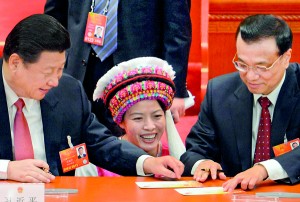Sunday Times 2
China’s hidden democratisation
View(s):By Jun Zhang and Gary H. Jefferson
SHANGHAI – Since Xi Jinping was anointed as China’s new president, reports of official repression of dissent have hardly abated. But, while criticism of China’s human rights record clearly has merit, it is important not to lose sight of the extent of genuine political change in China.
Since 1978, China’s political system has overseen the transfer of a wide swath of economic power from the state to its people. As a result, Chinese may operate family farms, own homes and businesses, control their educational choices, patent inventions, and amass fortunes. It is precisely the exercise of these individual rights that has created the foundation for China’s ongoing economic transformation.
By creating the diverse and conflicting private economic interests that are typical of a capitalist society, China has had to create a set of institutions to clarify and mediate the exercise of these rights. These emerging institutional arrangements include contracts and commercial law, bankruptcy and labour codes, and courts to oversee their enforcement. More recently, local commissions, non-governmental organisations, an increasingly assertive media, and sanctioned public demonstrations have become established channels for mediating social conflict.

An ethnic delegate (C) gets the newly elected Chinese President Xi Jinping (L) and the newly elected Premier Li Keqiang (R) to sign an autograph during the 12th National People's Congress (NPC) in the Great Hall of the People in Beijing on March 14. AFP
But the transfer of rights has often been ambiguous, and is all too frequently vulnerable to official corruption. As a result, the Chinese Communist Party (CCP) is facing growing demands from the country’s well-educated and affluent middle class for greater transparency and accountability in the institutions on which their careers and livelihoods depend.
The enactment of the Administrative Litigation Law in 1990 enabled Chinese citizens to file lawsuits against local governments and public agencies. In recent years, hundreds of thousands of non-governmental organisations, often with official approval, have represented individuals on bread-and-butter issues, including land seizures, housing demolitions, environmental abuses, labour rights, and health care. The number of lawsuits against the government has ballooned to more than 100,000 per year, with plaintiffs winning more than one-third of the cases.
Another avenue through which Chinese residents advance their interests is public protest. Across the country, residents often protest wrongful eviction from their homes, frequently at the hands of corrupt local officials. One of us recently observed a street protest in Wuhan, the largest city in central China. Armed with banners and placards and a permit to demonstrate, street protesters, having learned that their homes were to be razed for redevelopment, agitated for and eventually secured substantially more compensation than the local government initially offered.
Such protests against public agencies, employers, and developers are now commonplace (though not always authorised). Indeed, China’s leaders recognise that if these channels for public expression of grievances were not available, the potential for civil and political unrest would be far greater than it already is. Generally, provided that protesters seek mediation and redress for their economic rights and do not attempt to encroach on the CCP’s authority, Chinese residents can advocate for their interests.
Some observers see the outline of a democratic system emerging. China’s president and prime minister are both limited to two five-year terms. Legislative debates within the National People’s Congress, whose nearly 3,000 members are elected from a wide range of local and national organisations, can be quite spirited.
For example, China’s bankruptcy law, enacted in 2006, required 12 years to negotiate, as factions within the Congress, the CCP, and the executive branch struggled to balance the interests of workers and creditors. Likewise, China’s property law was debated for years, as conservative forces, with the support of various media outlets, resisted marketisation and privatisation in defence of older citizens whose livelihoods continued to depend on the “iron rice bowl” of state ownership.
In short, though China’s political system functions in a manner that is far more centralised than outlined in the country’s constitution, it provides an increasingly meaningful set of avenues through which citizens can exercise influence over political life.
Two of the most vexing official constraints on Chinese citizens are restrictions on movement from the countryside to cities and limits on the number of children born to couples. Both policies reflect the skewed distribution of China’s population, with more than 90% squeezed into the eastern half of the country, creating extreme congestion and the potential for political instability. Nonetheless, responding to popular pressure, both restrictions have been substantially relaxed.
The Chinese leadership’s motivation in making such changes is not to embrace the ideals of the Universal Declaration of Human Rights or to placate foreign demands. Bound by the goal of economic prosperity, China’s leaders let the genie of individual rights out of the bottle. These same leaders now must tolerate – even facilitate – the creation of institutions to mediate the conflicts over these rights that inevitably result.
So long as China continues to offer basic economic rights to its citizens, these incremental changes, though slow, will drive the country’s gradual democratisation. Where rights are well established, progress in building a civil society will surely follow.
Jun Zhang is Professor of Economics and Director of the China Center for Economic Studies at Fudan University, Shanghai.
Gary H. Jefferson is Professor of Economics at the International Business School and Chair of East Asian Studies at Brandeis University.
Copyright: Project Syndicate, 2013. Exclusive to
the Sunday Times.
www.project-syndicate.org
Follow @timesonlinelk
comments powered by Disqus



















